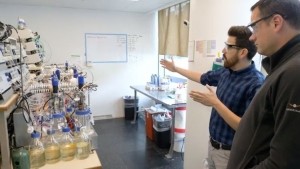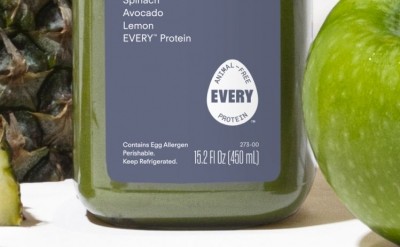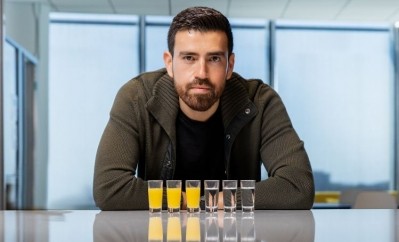Egg proteins… without chickens: Clara Foods teams up with innovation arm of world’s largest brewer

Precision fermentation – using yeast and other microorganisms as tiny food factories to produce proteins that have historically been sourced from animals (whey, casein, albumin, collagen etc) – is a potentially exciting because it can be greener, cleaner, and kinder than industrialized animal agriculture, said Patrick O’Riordan, founder of BioBrew, a tech platform venture in ZX Ventures looking to apply its fermentation and downstream processing expertise beyond beer.
'If we don't make it viable at scale, it won't live up to expectations because quite simply, it won't be able to compete'
The key question is whether it’s a niche endeavor or truly scalable technology that can compete with animal proteins on a global basis, said O’Riordan, who first met Clara Foods founder Arturo Elizondo when he was in the Indiebio accelerator back in 2015.
“What we're talking about here is complex large molecules, proteins, and this is something that really hasn't been done before and if we don't make it viable at scale, it won't live up to expectations because quite simply, it won't be able to compete.
“If you look at the recent report into alternative proteins from Boston Consulting Group and Blue Horizon Ventures they’re talking about millions of metric tons of fermented protein by 2035, so facilities will have to be able to produce into 10, 15, 20,000 metric tons of protein to be commercially viable.”
‘We're the world's biggest fermenters; surely there's some knowledge we could apply here?’
For some food ingredients, O’Riordan pointed out, precision fermentation is already operating at scale, with engineered microbes now used to make everything from chymosin (an enzyme used in cheesemaking to replace rennet from calves’ stomachs) to B vitamins, fine chemicals and amino acids.
However, industrial-scale microbial fermentation to make milk and egg proteins is new territory, he said: “Today precision fermentation is at a much smaller scale with very high value ingredients. But we said okay, we're the world's biggest fermenters; surely there's some knowledge we could apply here?
“We have an understanding of how organisms behave and the importance of process controls and treatments, of feedstock, the downstream separation, purification and concentration to get the levels of purity that the industry demands. We have also been looking at applications for spent yeast left over from the beer brewing process.”
On a more practical level, he said, “We have a massive footprint globally, so if anybody can get food locally sourced and produced or brewed on a global scale, we should be able to do that.”
“The technology [to do precision fermentation for egg proteins at scale] will be probably an adaptation of existing technology; we have a lot of ideas as to how we could apply a lot of what we do today in beer into this area.”

‘First of a kind partnership that will enable us to get one step closer to the scale that will unlock our ability to penetrate the mass market’
So how exactly will the partners work together beyond R&D work?
“It's a multi-year technology partnership,” said Elizondo, who is currently producing his proteins via toll manufacturers operating in the scale of thousands of liters to “prove out the market.”
“But what’s beyond that? We need access to hundreds of thousands of liters in fermenters and millions of liters of fermentation capacity globally.
“This partnership [with ZX Ventures] is truly is a first of a kind that will enable us to get one step closer to the scale that will unlock our ability to penetrate the mass market and get our proteins in the hands of everyone, everywhere,” added Elizondo, who recently teamed up with partner Ingredion to announce the commercial launch of ‘animal-free’ pepsin, an enzyme traditionally sourced from pig stomachs that’s used in everything from digestive supplements to the preparation of plant-based proteins.
The product pipeline
Down the road, multiple products will be commercialized, from single proteins to combinations, said Elizondo, who is particularly excited about individual proteins in eggs with unique properties that have not previously been explored as it’s too expensive to extract them from eggs, such as a highly soluble egg protein for beverages (coming out later this year) and anti-microbial proteins.
An egg white replacer containing animal-free egg albumin is also in the pipeline, said Elizondo, who said food companies are attracted to animal-free egg proteins for multiple reasons, from sustainability to the ability to make vegan claims, to simply wanting a consistent, reliable, and safe supply of product with more reliable pricing, a particular issue in the egg market given the volatility caused by everything from avian flu or salmonella, to covid-19.
“By 2025, over half of the US egg market will need to shift to cage free [owing to pledges made by multiple retailers and CPG companies], so for the first time in history, the majority of the market will be premium,” said Elizondo, who is aiming to match and ultimately undercut animal-sourced proteins on price.
‘We know biologically that yeast is more efficient than a chicken in terms of converting carbon into protein’
At base, he said, “We know biologically that yeast is more efficient than a chicken in terms of converting carbon into protein and we know that the technology itself can undercut the production of large scale industrial egg production.”
The focus now is scaling up and driving efficiency in every aspect of the process, from the productivity of the organism, to the sustainability of the feedstock, to the ability to valorize/upcycle co-products of the process such as spent yeast.
“One of our longer-term objectives is how do we use waste product and upcycle that as there's a lot of excess starch out there.”
Founded by Elizondo and David Anchel in late 2014, Clara Foods engineers yeast to express proteins found in eggs during a fermentation process requiring a source of sugars as the feedstock.
The proteins are secreted into the broth in the tank and removed via a simple filtration process. The genetically engineered yeast is not present in the final proteins, which would not be classified as ‘bioengineered’ under new federal labeling laws, says the company, which raised $15m in a Series A round in 2016 and $40m in a Series B in 2019.
Clara Foods has put together GRAS (generally recognized as safe) determinations for several proteins, and is submitting them to the FDA, says Elizondo, who noted that the proteins are already found in eggs, so do not present novel safety issues for regulators. Pic credit: Clara Foods

















